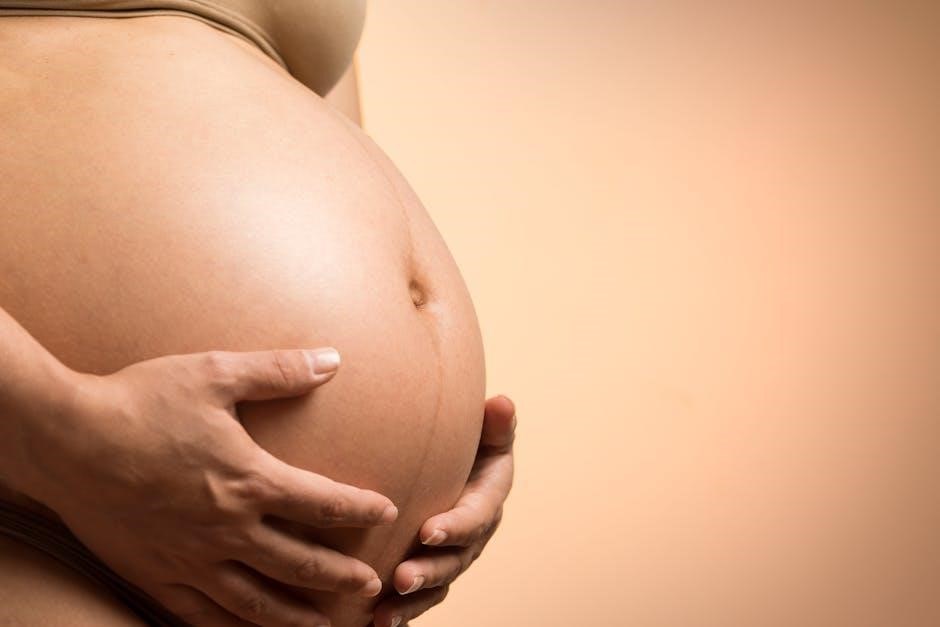The Complete Australian Guide to Pregnancy and Birth is a comprehensive resource blending expert advice from doctors, midwives, and specialists with real-life stories to empower mothers․
Overview of the Guide
The Complete Australian Guide to Pregnancy and Birth is a go-to resource for expectant mothers, offering detailed insights into every stage of pregnancy and beyond․ It covers topics like prenatal care, childbirth options, and postnatal recovery, ensuring a holistic approach․ The guide balances factual information with personal stories, providing reassurance and practical advice․ With contributions from healthcare experts, it addresses common discomforts, nutrition, and lifestyle adjustments․ Designed to empower, it helps families make informed decisions, fostering a positive and prepared journey through pregnancy and parenthood in Australia․
Importance of Education and Preparation for Australian Mothers
Educating and preparing Australian mothers is crucial for a positive pregnancy and birth experience․ Knowledge empowers women to make informed decisions, reducing anxiety and fostering confidence․ Understanding physiological processes, medical options, and emotional changes ensures they are equipped for each stage․ The guide emphasizes the role of education in tackling birth trauma and improving outcomes․ By learning from expert advice and real-life experiences, mothers can navigate pregnancy with clarity, ensuring a healthier and more joyful journey for themselves and their families․ Preparation is key to a fulfilling and informed experience in Australia․
Expert Contributions: Doctors, Midwives, and Health Specialists
The guide benefits from contributions by top Australian doctors, midwives, and health experts, ensuring evidence-based, reliable information․ Their insights cover prenatal care, labour options, and postnatal recovery, offering a balanced view․ Specialists share practical tips and address common concerns, making the guide a trusted resource․ These experts’ collaboration ensures comprehensive coverage of physical and emotional aspects, providing readers with authoritative guidance․ Their involvement elevates the guide, making it indispensable for modern mothers seeking informed, holistic care in Australia․
Planning and Preparing for Pregnancy
Planning for pregnancy involves understanding fertility, health screenings, and lifestyle adjustments to ensure a healthy conception and pregnancy journey in Australia․
Understanding Fertility and Conception
Understanding fertility and conception is crucial for planning a pregnancy․ It involves knowledge of ovulation cycles, sperm health, and how lifestyle factors like diet and stress impact fertility․ Education on these topics helps couples make informed decisions and prepare their bodies for conception․ Additionally, age-related fertility considerations and the importance of pre-conception health checks are highlighted to ensure a healthy start․ This section provides practical insights and expert advice to guide prospective parents through the journey of trying to conceive․
Pre-Pregnancy Checkups and Health Screenings
Pre-pregnancy checkups and health screenings are essential for ensuring a healthy pregnancy․ These appointments allow healthcare providers to assess overall health, identify potential risks, and recommend necessary vaccinations or treatments․ Screenings may include blood tests, blood pressure checks, and discussions about medical history․ Lifestyle factors, such as diet, exercise, and mental health, are also addressed to optimize well-being before conception․ Regular checkups help identify and manage chronic conditions, ensuring the best possible outcomes for both mother and baby․ Early preparation is key to a healthy and empowered pregnancy journey․
Lifestyle Adjustments for a Healthy Pregnancy
Lifestyle adjustments are crucial for a healthy pregnancy․ Adopting a balanced diet rich in essential nutrients, staying hydrated, and avoiding alcohol, tobacco, and caffeine is recommended․ Regular physical activity, such as walking or prenatal yoga, supports physical and mental well-being․ Managing stress through mindfulness or relaxation techniques is also beneficial․ Ensuring adequate sleep and maintaining a healthy weight can further promote a positive pregnancy experience․ These adjustments not only support the baby’s development but also prepare the mother’s body for the challenges ahead, fostering a holistic approach to pregnancy and parenthood․
Prenatal Care in Australia
Prenatal care in Australia is comprehensive, offering expert-backed guidance on regular check-ups, health screenings, and managing discomforts․ It ensures mothers and babies receive the best possible care․
Antenatal Care: What to Expect
Antenatal care in Australia is a personalized journey, ensuring mothers-to-be receive tailored support․ Regular check-ups with healthcare providers monitor fetal development and maternal health․ screenings for potential risks․ Expect guidance on managing common discomforts, nutrition, and safe exercise routines to support physical and mental well-being․ This comprehensive approach ensures both mother and baby receive optimal care throughout pregnancy, fostering a positive and informed experience․
Common Discomforts and Remedies During Pregnancy
Pregnancy often brings physical challenges, such as morning sickness, back pain, and swollen feet․ Staying hydrated, eating small meals, and practicing gentle exercises can alleviate symptoms․ For back pain, proper posture and prenatal yoga are recommended․ Swollen feet benefit from elevating legs and wearing comfortable shoes․ Natural remedies like cold compresses and rest can provide relief․ These discomforts are manageable with practical strategies, ensuring a more comfortable pregnancy journey while prioritizing maternal and fetal well-being; Understanding these remedies empowers expectant mothers to navigate pregnancy with confidence and ease․
Nutrition and Exercise Guidelines
A balanced diet rich in essential nutrients is vital during pregnancy․ Focus on whole foods, fruits, vegetables, lean proteins, and whole grains to support fetal growth․ Prenatal vitamins, including folic acid and iron, are recommended․ Regular, moderate exercise like swimming and yoga can improve physical and mental health․ Avoid high-risk activities and consult healthcare providers for personalized advice․ Proper nutrition and exercise help prevent complications like gestational diabetes and promote a healthy weight․ Staying active also enhances mood and energy levels, supporting overall well-being throughout pregnancy․

Stages of Pregnancy
Pregnancy is divided into three trimesters, each with unique physical and emotional changes․ The first trimester focuses on embryonic development, the second on growth, and the third on preparing for birth․
First Trimester: Physical and Emotional Changes
The first trimester, spanning weeks 1 to 12, marks significant physical and emotional transformations․ Women often experience morning sickness, fatigue, and breast tenderness due to hormonal surges․ Emotional shifts, such as excitement or anxiety, are common as the reality of pregnancy sets in․ The embryo undergoes rapid development, with vital organs forming by week 12․ Lifestyle adjustments, such as a balanced diet and adequate rest, are crucial to support both mother and baby․ This period also brings heightened emotions, as families begin preparing for the arrival of their little one․
Second Trimester: Growth and Development
The second trimester, spanning weeks 13 to 26, is a period of rapid growth and development․ Morning sickness often subsides, replaced by increased energy levels․ The baby’s organs mature, and movements become more pronounced․ Sensory development accelerates, with the baby able to detect light, sound, and even taste․ Emotionally, mothers may feel more connected to their growing baby․ Regular prenatal check-ups ensure healthy progression․ This phase is crucial for preparing emotionally and practically for parenthood, as the guide provides detailed insights into supporting both physical and emotional well-being during this transformative time․
Third Trimester: Final Preparations for Birth
The third trimester, spanning week 28 to birth, is a critical period of final growth and preparation․ The baby gains weight, organs mature, and movements become stronger․ Mothers may experience physical discomforts like back pain and Braxton Hicks contractions․ Emotionally, excitement and anxiety often rise as the due date approaches․ This phase focuses on finalizing birth plans, attending parenting classes, and preparing the home; Regular prenatal check-ups monitor the baby’s position and overall health․ The guide emphasizes the importance of mental and physical readiness, ensuring mothers feel empowered and informed as they approach this life-changing moment․

Labour and Birth Options
Explore various childbirth options, including hospital, home, and birth centers, and understand interventions and pain management to make informed decisions tailored to your preferences and needs․
Understanding Labour: Stages and Signs
Labor progresses through distinct stages, from early contractions to active and transitional phases, culminating in delivery and postpartum recovery․ Recognizing signs, such as consistent contractions and cervical dilation, is crucial for timely decisions․ Emotional and physical changes intensify as labor advances, requiring mental preparation and support․ Understanding these stages empowers mothers to navigate the process confidently, aligning with expert advice from doctors and midwives․ This knowledge fosters a holistic approach, blending medical insights with personal experiences to create a supportive and informed journey for Australian mothers․
Childbirth Options: Hospital, Home, and Birth Centers
Australian mothers have access to diverse childbirth options, each offering unique benefits․ Hospitals provide advanced medical support and safety, ideal for high-risk pregnancies․ Home births allow for a personal and intimate experience, best suited for low-risk pregnancies with proper medical oversight; Birth centers offer a midwife-led, natural approach in a homelike setting, blending comfort with medical accessibility․ Each option is supported by expert guidance, ensuring mothers can choose a setting that aligns with their preferences and health needs, fostering a positive and empowering birth experience tailored to individual circumstances and priorities․
Interventions and Pain Management
Pregnancy and birth involve various medical interventions and pain management options․ Expectant mothers can explore natural methods like breathing techniques and water immersion․ Medical options include epidural anesthesia and nitrous oxide․ Each approach is tailored to individual needs, ensuring comfort and safety․ The guide emphasizes informed decision-making, allowing mothers to choose what best suits their birth plan and personal preferences, supported by expert advice and care․

Postnatal Care and Recovery
Postnatal care focuses on physical and emotional healing, ensuring a smooth transition for mothers and babies․ Expert guidance supports recovery, bonding, and overall well-being during this critical period․
Physical and Emotional Recovery After Birth
Physical recovery after birth involves healing from delivery, managing fatigue, and restoring strength․ Emotional recovery addresses mental well-being, tackling birth trauma, and adjusting to parenthood․ Both aspects are crucial for new mothers․ The guide emphasizes the importance of rest, nutrition, and support systems to aid recovery․ It also highlights the role of healthcare providers in monitoring physical healing and providing mental health resources․ A holistic approach ensures mothers feel supported during this transformative period, fostering a healthy transition for both mother and baby․
Postpartum Care for Mother and Baby
The guide provides detailed insights into postpartum care, focusing on the mother’s physical healing, emotional well-being, and baby care․ It emphasizes regular medical check-ups, proper wound care, and monitoring for complications․ For babies, topics include feeding, sleep patterns, and hygiene․ The guide also highlights the importance of rest, nutrition, and mental health support for mothers․ Practical advice on bonding with the baby and navigating lifestyle adjustments is included․ Support systems, such as partners, family, and community groups, are encouraged to aid recovery․ This section ensures a smooth transition for both mother and baby, promoting overall well-being․
Support Systems for New Parents
Building a strong support network is crucial for new parents․ Family, friends, and community groups play vital roles in providing emotional and practical help․ Partners and close relatives can share responsibilities, while professional support, such as lactation consultants and mental health specialists, addresses specific needs․ The guide highlights the importance of connecting with local parenting groups and helplines for additional resources․ Encouraging open communication and seeking help when needed fosters a healthier transition into parenthood․ A robust support system ensures both mothers and fathers feel empowered and less isolated during this life-changing journey․

Special Considerations
This section covers high-risk pregnancies, multiple births, and birth trauma, offering insights and support for complex situations during pregnancy and birth in Australia․
High-Risk Pregnancies and Complications
High-risk pregnancies involve complications like pre-term labor or low birthweight, requiring specialized care․ Factors such as pre-existing health conditions or environmental influences like climate change can increase risks․ The guide offers insights into managing these challenges, emphasizing tailored medical approaches and lifestyle adjustments․ It also addresses the emotional and physical toll of complications, providing practical advice for expectant mothers․ By combining expert recommendations with real-life experiences, the section empowers women to navigate high-risk pregnancies with confidence and informed decision-making, ensuring the best possible outcomes for both mother and baby․
Multiple Births: Twins, Triplets, and Beyond
Caring for multiple pregnancies, such as twins or triplets, requires specialized attention․ The guide offers detailed insights into the unique challenges of multiple births, including prenatal care, nutrition, and delivery options․ It highlights the importance of regular check-ups and monitoring to ensure healthy growth․ The section also addresses emotional and logistical considerations, providing tips for managing daily life with multiples․ Drawing from expert advice and firsthand experiences, this chapter equips families with the knowledge to navigate the complexities of multiple births confidently, fostering a positive and informed journey from pregnancy to parenthood․
Birth Trauma and Mental Health Support
Birth trauma and mental health challenges are sensitively addressed in the guide, emphasizing the importance of emotional well-being․ It explores the emotional and psychological impacts of traumatic birth experiences and provides resources for healing․ The section highlights the significance of seeking support, whether through counseling, support groups, or professional guidance․ By fostering a culture of understanding and empathy, the guide encourages open conversations about mental health․ Practical strategies for recovery and self-care are offered, ensuring mothers feel empowered to prioritize their well-being during this transformative journey․
Future Considerations
The guide explores family planning, climate change impacts, and emerging trends in Australian maternity care, offering insights into future challenges and innovations for expectant mothers․
Family Planning and Future Pregnancies
Family planning is a crucial aspect of reproductive health, shaping decisions for future pregnancies․ The guide emphasizes the importance of understanding fertility and conception, while addressing emotional and psychological readiness․ Many women seek a different experience in subsequent pregnancies, often desiring continuity of care with the same healthcare providers․ The book highlights the role of pre-conception health screenings and lifestyle adjustments to optimize outcomes․ It also explores the impact of climate change on pregnancy planning and the growing demand for personalized maternity care․ By addressing these factors, the guide empowers women to make informed decisions about their reproductive journey․
Impact of Climate Change on Pregnancy and Birth
Climate change presents emerging risks for pregnancy and birth in Australia․ Rising temperatures and extreme weather events can lead to gestational complications, with studies linking heat exposure to higher risks of pre-term births and low birthweight․ The guide highlights how environmental factors may influence fetal development, particularly in vulnerable communities․ It emphasizes adapting prenatal care to address these challenges, ensuring expectant mothers are equipped to mitigate risks․ By understanding these impacts, the book advocates for proactive measures to safeguard maternal and fetal health in a changing climate, offering insights for a resilient future․
Emerging Trends in Australian Maternity Care
Australian maternity care is evolving with a focus on holistic, women-centered approaches․ Telehealth services are expanding, improving accessibility for remote communities․ There is a growing emphasis on mental health support and continuity of midwifery care․ Personalized birth plans and culturally sensitive practices are becoming priorities․ The guide highlights these trends, reflecting a shift toward more empathetic and flexible care․ By integrating modern advancements with compassionate, individualized support, Australian maternity care is revolutionizing the experience for mothers, ensuring safer, more empowering outcomes for all families․ This approach prioritizes both physical and emotional well-being, setting a new standard for maternal care․
The Complete Australian Guide to Pregnancy and Birth empowers mothers with knowledge, fostering a holistic approach to pregnancy and birth․ It emphasizes community and healthcare provider collaboration, ensuring informed, confident decisions for a positive experience․
Empowering Mothers with Knowledge
The Complete Australian Guide to Pregnancy and Birth serves as a go-to resource, blending expert advice with real-life stories to foster confidence and preparedness․ It emphasizes education as a powerful tool, helping mothers navigate pregnancy, childbirth, and postpartum recovery․ By addressing topics like antenatal care, childbirth options, and postnatal support, the guide ensures women feel informed and empowered․ It also highlights the importance of community and healthcare provider collaboration, promoting a holistic approach to pregnancy and birth․ This comprehensive guide is designed to support mothers in making informed decisions, ensuring a positive and fulfilling experience․
The Role of Community and Healthcare Providers
Community and healthcare providers play a vital role in supporting expectant mothers, offering guidance and care throughout pregnancy and beyond․ The Complete Australian Guide to Pregnancy and Birth emphasizes the importance of a collaborative approach, where healthcare professionals work alongside families to ensure personalized care․ From pre-pregnancy checkups to postnatal recovery, healthcare providers offer expert advice, while communities provide emotional and practical support․ This partnership fosters a nurturing environment, empowering mothers to make informed decisions and thrive during this significant life journey․ The guide underscores the value of this teamwork in achieving positive outcomes for both mother and baby․
A Holistic Approach to Pregnancy and Birth
A holistic approach to pregnancy and birth focuses on addressing the physical, emotional, and mental well-being of expectant mothers․ The Complete Australian Guide to Pregnancy and Birth embraces this philosophy, integrating conventional medical advice with alternative therapies and lifestyle adjustments․ By prioritizing mindfulness, nutrition, and emotional support, the guide encourages a balanced journey through pregnancy․ This approach empowers mothers to make informed decisions, fostering a sense of control and confidence․ The guide’s emphasis on holistic care reflects its commitment to supporting the whole person, ensuring a nurturing and fulfilling experience for all․